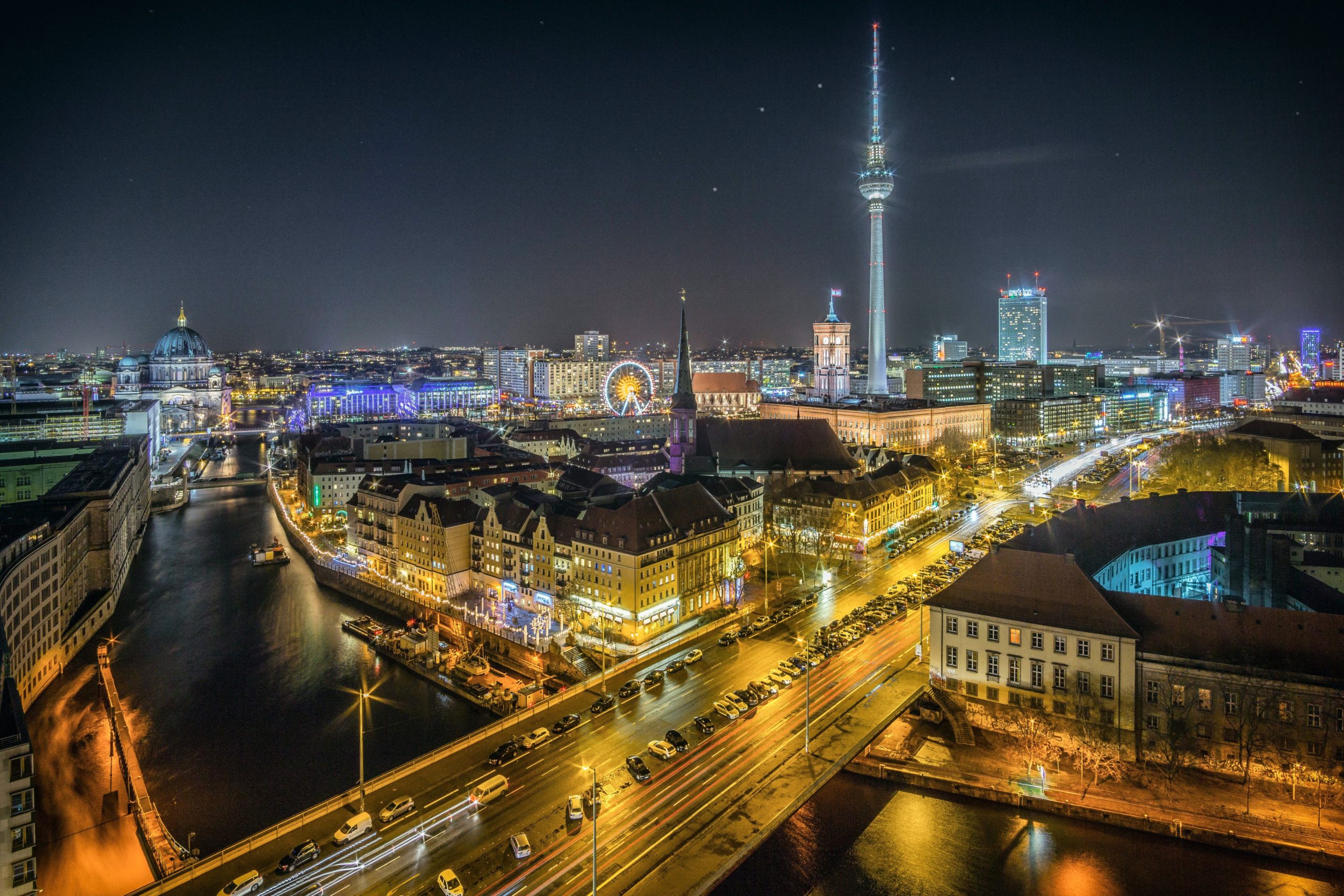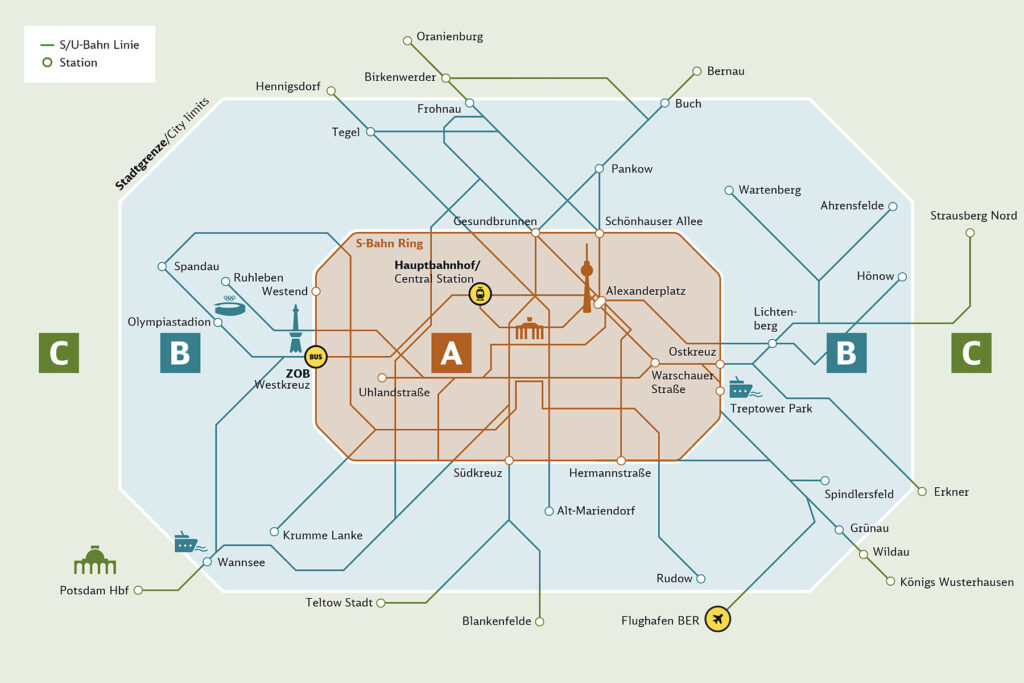Dates & Deadlines
- Application Deadline: Friday, January 2, 2026
- Deposit Deadline: Friday, January 9, 2026
- Balance of Program Fees Due: Tuesday, February 10, 2026
- Tuition Due: Check your campus calendar
- Pre-Departure Orientation: Saturday, March 7, 2026
- Program Dates: April 9-June 5, 2026
Contact your WCCCSA Campus Coordinator for more information about spending the spring quarter in Berlin.
Program Documents
Zoom Information Sessions
All zoom information sessions for this program have passed.
About the Program
Berlin is a vibrant and historically layered city that offers study abroad students a unique opportunity to engage with the past while experiencing a forward-thinking, multicultural metropolis. As Germany’s capital, Berlin is known for its dynamic blend of old and new—where remnants of the Berlin Wall stand near cutting-edge art galleries, and centuries-old architecture coexists with modern design. Students can walk through history in neighborhoods like Mitte and Kreuzberg, explore global perspectives through the city’s diverse communities, and participate in a thriving academic and cultural scene. Studying abroad in Berlin means living in a city that constantly reinvents itself, making it an inspiring setting for learning, exploration, and growth.
Click here for a 2-minute video from Professor Don – Discover Berlin: A Life-Changing Study Abroad Experience in 2026!
Location
Classes will be held at the facilities of AIFS (Amercian Institute for Foreign Study) located in the heart of Berlin, a few blocks from the Museum Island and vibrant Alexander Platz. With large access to many bus and U-Bahn lines, it is easy to get to classes from anywhere in the city. Or take a stroll and discover the unique neighborhoods on foot.
Campus & Classrooms
Wi-Fi is available throughout the AIFS student center, and you will have access to a printer.
Housing
Twin-bedded studio apartments in a centrally located residence in Berlin. Maximum 45-minute travel time to the AIFS Center. Each apartment will have single beds, a bathroom, and a fully equipped kitchenette. Bed linens, towels, and wireless internet will all be provided.
Transportation
Travel pass: unlimited travel on the S-Bahn, U-Bahn, buses, trams and regional trains in zones A & B of Berlin for the duration of the program, plus an extension to the travel pass for any activities taking place in zone C.
Faculty
Dr. Don Ludwig’s passion for travel and social justice began as a first-generation college student at Spokane Community College. While in college, it was two study abroad trips—8 weeks in Europe and then 5 weeks in Israel, Greece, and Egypt—that first opened his eyes to the transformative power of seeing the world through new lenses. Since then, Don has explored cultures across five continents: studying in Pakistan and Thailand, and leading student service-learning projects to Mexico, Cuba, Jamaica, Honduras, Puerto Rico, South Africa and beyond.
In Spring 2023, Don led WCCCSA’s Rome Study Abroad program—an unforgettable journey that reaffirmed his passion for the transformational power of immersive, place-based learning. Don is thrilled to return to Europe—this time to Berlin, Germany, a city that lives at the crossroads of history and reinvention. With family roots tracing back to Germany—Berlin feels less like a destination and more like a homecoming. Having traveled to Germany many times, Don is especially excited for this extended opportunity to learn and teach in a place known for its rich cultural diversity, social resilience, and creative spirit. For Don, Berlin isn’t just a backdrop—it’s the heartbeat of his teaching, where academic exploration meets real-world stories in a city that teaches at every corner.
A tenured professor of Sociology at Clark College in Vancouver, Washington, Don designs his courses to be both globally and locally grounded, culturally relevant, and deeply connected to real-world issues—equipping students to think critically, engage compassionately, and work toward a more just and equitable world. Outside the classroom, you might find him cycling the San Juan Islands or recounting his coast-to-coast bike ride across the U.S. (yes, 44 days!). A former rock-climbing guide and Mt. Rainier summiteer, Don shares life’s adventures with his wife Kathy and their three grown children—adopted from Lesotho, Africa, and Washington State foster care. Whether walking Berlin’s streets or teaching in Clark’s classrooms, Don invites students to see the world not just as it is, but as it could be.
Proposed Classes
SOC&101/SOC&201 – Intro to Sociology: Berlin – Memory, Art & Entertainment
(*Students may take this class as either 101 or 201)
Berlin’s past is written in its streets, art, culture, and institutions—making it an ideal setting to explore sociology in action. We’ll confront big questions: How does a democracy crumble from within? What forces led to fascism and genocide? At the Reichstag and Brandenburg Gate, we’ll trace the rise, fall, and rebirth of German democracy, examine the Berlin Wall’s legacy—still shaping EastWest relations and immigration debates—and uncover the real story behind the tense Cold War standoff at Checkpoint Charlie. During visits to Sachsenhausen and the Holocaust Memorial, we’ll wrestle with the mechanisms of terror and collective remembrance. At the Stasi Museum, we’ll compare East Germany’s surveillance state to today’s AI-driven monitoring—exploring freedom, privacy, and the enduring influence of memory on social control.
Berlin’s vibrant cultural scene—from sports to food to nightlife—tells a powerful story of resistance and transformation. We’ll decode the politics of football rivalries between Hertha BSC and Union Berlin, visit a Street Food Thursday at Markthalle Neun to see how food reclaims heritage in a globalized city, and dive into the underground club scene where techno’s Cold War origins still echo in today’s world-famous nightlife and open attitudes toward sexuality. Through site visits, scavenger hunts, and reflective discussions, we’ll explore how memory, art, and collective action shape identity and social change—inviting students to see how they, too, can help write history.
Sociology 161: Sacred Crossroads – Exploring World Religions in Berlin
Discover the Sacred Crossroads of Berlin—where cathedrals, synagogues, mosques, and meditation halls share the same skyline. In this immersive study abroad course, we’ll explore the rich traditions of Hinduism, Buddhism, Confucianism, Taoism, Islam, Judaism, Christianity, and Atheism—not just through textbooks, but through real-world encounters that bring belief systems to life. Through guided visits, guest speakers, and reflective discussions, we’ll examine how rituals, symbols, and spiritual practices shape individuals, families, and societies—and how people across cultures find meaning, purpose, and belonging.
From Berlin’s newest mosque to the haunting brass plaques of the Stolpersteine, from the Bonhoeffer-Haus to a Buddhist meditation center, this course explores the ways religion—and non-religion—both reflect and challenge power, culture, and identity. Whether you’re curious about faith, fascinated by philosophy, or passionate about social justice, this journey invites you to experience Berlin as a living classroom of sacred crossroads. As Gandhi said, “Be the change you wish to see in the world.”
The third class will be a German culture class taught by a local faculty.
Excursions / Activities
- A guided tour of the Reichstag.
- A daytrip to Potsdam including round-trip transfer by public transport, a private bus for sightseeing in Potsdam, a 45-minute tour of Cecilienhof Palace and a guided tour of
- Sanssouci Palace with the services of a professional, English-speaking guide.
- A half-day excursion to the Memorial & Museum Sachsenhausen, including round-trip public transportation, entrance and audio guides.
- A half-day sightseeing tour of Berlin by private bus with the services of a professional, English- speaking guide.
- An orientation program in Berlin consisting of a meeting with experienced AIFS staff, covering topics such as general acclimation to Berlin, safety and security issues, cultural differences, travel, money and cultural activities.
Independent Travel
You may use your free time on weekends & holidays to explore the neighborhoods of Berlin, travel throughout Germany or beyond to some of Europe’s great cities including London, Amsterdam, Rome, and Paris.
Costs: $7,945
After a deposit or final payment is collected, this money will not be refunded. If a student or faculty member should decide not to participate in an activity or excursion, no money will be refunded.
Included in the Cost
- Apartment in centrally located in Berlin
- 24/7 emergency contact service
- Pre-Departure Orientation
- Onsite Orientation
- Public transportation pass for Berlin
- Comprehensive Health Insurance
- All Excursions/Activities listed above
Not Included in the Cost
- Airfare
- College tuition & fees for 15 credits
- Course books/materials
- Passport & visa fees, if applicable
- Meals other than those listed
- Personal expenses
- Additional fieldtrips and excursions to those listed
- Anything not specified as included in the program
Scholarships
WCCCSA Berlin participants are all eligible for the $1,000 WCCCSA scholarships.
Pre-Departure Orientation (Mandatory)
A team of WCCCSA Study Abroad Coordinators will provide details on logistics, health, and safety information to help you prepare for your study experience in Berlin. You are more than welcome to invite parents, guardians, or whomever you would like to attend the mandatory orientation with you. Lunch will be included.
- Date: Saturday, March 7, 2026
- Time: TBD
- Location: Cascadia College
- What to bring:
- Signed copy of the Student Guidelines
- Copy of your passport
- Flight itineraries
- Notepad and pen to take notes
- And questions!


